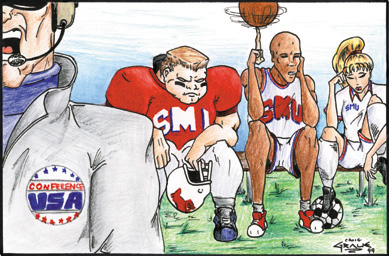By Courtney Wheeless staff reporter The acceptance of a bid to Conference USA offers TCU an opportunity to hit new parts of the country in its athletic recruiting efforts. TCU will leave behind the Western Athletic Conference and primarily regional competition in the 2001-2002 season when the Frogs join C-USA. The four-year-old league, has 13 diverse universities, whose locations spread across the United States more than any other Division 1-A conference. Athletic Director Eric Hyman said recruiting efforts will be enhanced by moving to C-USA. "TCU will gain exposure to an extremely high percentage of the nation's population, the media centers and large urban areas of the Central and Eastern time zones," Hyman said. The league currently has exposure in 12 major television markets. Adding TCU to the conference will give it 13 major markets, including the Dallas/Fort Worth area market, the seventh-largest television market in the nation. First-year women's basketball coach Jeff Mittie said moving to C-USA will be an attractive thing for TCU in recruiting both students and student-athletes. "I think there is more familiarity with the areas in Conference USA," Mittie said. "You have major cities where the universities are the focal point. The television packages will put TCU in those cities."
When TCU joined the WAC in 1996, California ranked sixth in student enrollment by state. After a full season of WAC competition against the California schools Fresno State, San Jose State and San Diego State, student enrollment from California jumped to the No. 4 spot. Future C-USA competition in Florida, a football powerhouse state, provides opportunities for TCU to put a foot in the door to recruit talented athletes. Head football coach Dennis Franchione said recruiting opportunities are directly related to the conference in which the team plays. "Recruiting is so conference-oriented," Franchione said. "It's university-oriented too, but the conference you are in makes a difference. I'm hopeful Conference USA will elevate our recruiting." Playing games and participating in athletic competitions in new parts of the country will increase the visibility of TCU as both a university and a team. This exposure will aid TCU in recruiting students in more Eastern and Midwestern states. TCU recruits most heavily from Texas and Oklahoma. A large number of students also come from Colorado, Kansas, Missouri and Louisiana. Head soccer coach David Rubinson said new recruiting opportunities will arise from joining C-USA because of the new geographical presence. "I think it will open up more areas of the Midwest and East," he said. "It won't hurt our West Coast recruiting, but it will help in some new areas." Even with more focus on East Coast schools, Rubinson said he doesn't expect a huge change in TCU's recruiting policies as a whole. "Recruiting at TCU is easy," Rubinson said. "It doesn't matter where the students come from. The quality of the university and those who are here is what sells people." Rubinson said he does not expect a huge change in recruiting for the soccer teams as a result of TCU joining C-USA. Women's tennis coach Roland Ingram said he feels the same way. "For the entire university, Conference USA is going to be great," Ingram said. "It's not going to affect us much, because we play an independent schedule and because it would be too expensive to play and travel to the schools in the conference." Ingram said the conference change will not affect recruiting that much either. Ingram approaches potential recruits for the tennis team by watching them at tournaments in the summer and later writing letters to them expressing interest in their tennis abilities. While Ingram rarely sees the students play when he recruits on the international level, he looks at players' records to determine their caliber. Although the conference switch will not alter how many of the coaches approach recruiting, Ingram said being part of C-USA is still a plus. "For recognition, Conference USA is going to help us in recruiting," he said. Courtney Wheeless
By Gibbs Colgin staff reporter TCU officials are saying that despite the initial spending to join Conference USA, the university will benefit from increased revenue and media coverage. TCU paid $2 million to get into C-USA and for the first five years, will not receive any shared revenue, sources have said. TCU must give up any money from revenue possibilities, such as television or bowl games, to other members of the conference to compensate for their losses. But the benefits that TCU recieves in the future could nullify these negatives. Associate Athletics Director Jack Hesselbrock said, for example, if a network television station pays C-USA to televise a game the money is usually split between all of the teams in the conference, but TCU will forfeit their share. TCU will not have to pay the Western Athletic Conference a fee to leave because they are meeting their five-year obligation to the conference. However, according to WAC bylaws, TCU will not be able to share in revenue distribution during its final year of participation in the WAC. But the financial advantages of joining C-USA in the long run will outweigh the losses. Chancellor Michael R. Ferrari said, "We expect annual and long-term revenues from participation in C-USA to exceed the initial investment incurred in joining the conference and ongoing expenses." Ferrari said one of the advantages to being in the conference is the media exposure. "We will be able to share in increased revenues that reflect the attractive television (coverage), bowl game commitments and other benefits that have come to Conference USA in recent years," he said. Athletics Director Eric Hyman also said the media exposure will open TCU to more areas in the country. TCU has made, and continues to make, investments in its athletics program and one of the largest dividends is media exposure. "(C-USA) has exposure to large media markets, large urban areas," he said. "The circulation from a newspaper standpoint is over eight million. This will give us tremendous influence on a different part of the country than we've had in the past - Chicago, New York City, Cincinnati, New Orleans, Louisville and Charlotte." Hyman also said out of all of the sports teams at TCU, the football and basketball programs will benefit the most from C-USA's greater media exposure and basketball reputation. "C-USA has been ranked among the top five basketball leagues in the nations, rated seventh in football, is a signatory of the Bowl Championship Series and a member of the BCS discussions and features a national television football game of the week," he said. "The conference will have over 50 television exposures during the regular season and four of its teams are ranked among the nation's top 25 clubs entering the 1999-2000 season." "We anticipate substantial savings in travel costs in Conference USA versus the WAC, and we will have reduced travel time and missed class time for our student-athletes compared to the WAC," Ferrari said. Hesselbrock said food and lodging expenses will be cut in half because the opponents are closer. "Being part of a rising star among intercollegiate athletic conferences makes this not only a sound financial decision over the coming years, but also one that is consistent with TCU's aspirations to become a prominent private university in the nation," Ferrari said.
Gibbs Colgin
By Todd J. Shriber staff reporter TCU's switch to Conference USA is a move that will impact all of the university's athletic programs, but none more than football and men's basketball. At any college or university participating in Division I athletics, the driving forces of the athletic department with regard to sports revenue are football and men's basketball. TCU is no different. Athletics Director Eric Hyman has been committed to transforming TCU's athletic programs from unheard of to nationally prominent. It has become apparent that football and men's basketball will lead the charge, especially with the "on the rise" label attached to both programs. C-USA as a conference has been heralded for its basketball success more than its football prowess. The conference counts several perennial powers among its basketball members. The University of Cincinnati has been to the Final Four twice this decade. Louisville and Marquette have both won national titles. DePaul and University of North Carolina-Charlotte are both solid basketball schools. The increased level of competition has TCU head basketball coach Billy Tubbs excited about joining C-USA. "You've got to be excited about playing on the top level," Tubbs said. "It's kind of like changing jobs. We're not leaving TCU. We're just a different TCU." Tubbs doesn't think the move to the new conference will hurt the team's chances for success. "The move won't cost us any wins," he said. "I don't think we'll be playing Cincinnati and UNCC twice a year. We were 3-1 against the Big 12 last year. I'm only interested in winning the conference championship. If we couldn't compete in C-USA, we wouldn't have gone into the conference." C-USA does have an automatic berth to the NCAA Tournament. That automatic berth, coupled with more prestige and stability than the Western Athletic Conference, will benefit basketball recruiting. For football, the conference has tie-ins to more prestigious bowls than WAC, and more importantly, a chance to send a team to a Bowl Championship Series game. That means TCU could have a shot at playing for the national championship in football eventually.
"It's a tougher conference, a more prestigious conference and a conference that's gaining recognition quickly," Franchione said. "The WAC was a very unproven conference, but C-USA kind of jump-starts us." Last year, C-USA member Tulane went undefeated in football and finished ranked 10th in the nation. This year, Cincinnati upset Wisconsin, Southern Mississippi is ranked No. 21 and East Carolina is ranked No. 20 in the nation. Franchione realizes recruiting will still be the key to TCU's success in the new conference. "I know we have to keep improving," he said. "Recruiting is so conference oriented in football. We're going to have to elevate our recruiting to be competitive in C-USA." TCU's move to C-USA could eventually help Horned Frog coaches win recruiting wars over schools such as Rice and Southern Methodist who are staying in the WAC. C-USA could even give TCU the ability to compete in recruiting with the likes of the University of Texas and Texas A&M. "It has its advantages (being in C-USA)," Franchione said. "Certainly the prestige of the conference and name identification of some of the teams in the conference will help in recruiting. I think the biggest thing though is stability. I've spent most of my 18 months here defending the WAC. I don't have to do that with C-USA." Tubbs said the basketball program takes a different approach to recruiting. "We don't sell the conference we're in. We sell TCU basketball," Tubbs said. "But being in C-USA will certainly give us the upper hand in recruiting against in anybody in the WAC." Tubbs said there are other advantages for the basketball team joining C-USA. "C-USA is one of the top basketball conferences in the country. Period," Tubbs said. "Being in the conference will help make scheduling easier and you'll see a higher RPI ranking." The Ratings Percentage Index is a measuring stick used by the NCAA Tournament Selection Committee in selecting at-large teams for the tournament. TCU's RPI ranking has suffered from a lack of big-time opponents in the non-conference schedule and playing in a weak conference. Joining C-USA will change that scenario for the Horned Frogs. Tubbs did say there will be an adjustment period with regard to being in the new conference but promised that the Horned Frogs will not change their popular style of play. "People have to realize when you're going into a new conference it will take a year or two to adjust to what the other teams in the conference do," he said. "Our style of play would work in any conference with the right people on the floor. We don't adjust to people, we let them adjust to us."
Todd J. Shriber
By Chris Harrison staff reporter Although much of the hype around TCU's invitation and acceptance of a Conference USA bid has been focused on football and basketball, the switch affects all athletics. While no other collegiate sport has had the success in generating revenue like football and basketball, the conference change will affect every sport in which TCU competes in some way. The switch in conferences will change the outlook for some of the athletic programs more than others. But being the "new kid on the block" will certainly be different for every sport. Some of the athletes in the Horned Frog sports program can't wait to join, while others have to concentrate on bigger things than just some new teams to play with. The men's soccer team will play one season in the Missouri Valley Conference before joining the C-USA. The women's team will compete in the Western Athletic Conference next season prior to taking part in C-USA play in the 2001 season.
Men's tennis coach Michael Center said he agrees that the change in conferences is a good move for TCU, but it doesn't mean much to the tennis program. "We mainly want to concentrate on focusing in on the top 20 programs in the country. That's the most important thing for us," Center said. "There are so many great teams in Texas, we can't afford not to play all of the competition that is close by. We will probably play in the tournament (C-USA) at the end of the season, but that's about it." Like tennis, track is a sport that focuses on the individual athlete within the team. Head track coach Monte Stratton said the conference change is an overall athletics department improvement. "It's a competitive conference, but it won't make that much of a change for our track athletes," he said. "But what the switch in conferences does do, is improve our image. Not only the image of our track program, but the entire image of our athletic department. "Leaving the WAC behind and joining C-USA shows that TCU as a whole is going to be competing competitively in all sports. In the long run, it will turn out to be a great decision." Volleyball coach Sandy Troudt said the Volley Frogs are used to being the "new kids on the block." "I am so pumped. I think it's way cool. Moving to C-USA will be great for us, as well as the rest of the athletics department," Troudt said. "I'm ready to join a new conference where we won't be considered the new program. "I will still schedule schools in Texas, and hopefully, find a way to keep playing Hawai'i." Troudt said. "But for the most part, I can't wait to become part of a great thing in C-USA." Being in the thick of the competition is exactly what excites swimming coach Richard Sybesma. "C-USA is the best thing to happen at TCU in a long time. I know it's going to benefit our entire school," Sybesma said. "C-USA has great swimming competition, and we are going to be right there in the mix. I am really excited, and I know the rest of the athletics department is also."
Chris Harrison
By Victor Drabicky staff reporter The Western Athletic Conference wasted no time crying over the loss of TCU to Conference USA. The WAC announced Monday that Boise State University and Louisiana Tech University will be joining the WAC as of July 1, 2001. The announcement came just seven days after TCU announced it was leaving the WAC to play in C-USA and one day after the WAC's Board of Directors met in Denver. The Board of Directors is a committee made up of the presidents of the seven remaining WAC schools, plus recently signed Nevada. Jeff Hurd, senior associate commissioner of the WAC, said TCU's departure from the WAC had a serious effect on the conference, but the conference felt it needed to move on. "There is always a loss when a school decides to leave," Hurd said. "We just needed to move on and felt that adding Boise State and Louisiana Tech helped to fill the void left by TCU." Hurd said the addition of Boise State and Louisiana Tech will help solidify the eastern and western halves of the conference. "One of our main objectives was to strengthen the eastern and western sides of the conference," Hurd said. "Now we have five teams in the east and five teams in the west." In an interview with the Associated Press, WAC commissioner Karl Benson said the new WAC setup will offer more diversity. "I think we have a great mixture of urban and semi-rural type universities," Benson said. "Our destinations in Reno and Honolulu are attractive as well."
By adding Boise State and Louisiana Tech to its roster, the WAC is guaranteed a spot in the Humanitarian Bowl and is in close proximity to the Independence Bowl in Shreveport, La., and the Mobile Bowl in Mobile, Ala. Hurd said an increase in bowl participation will help the WAC with national exposure. "The bowl games open up a new area for the WAC," Hurd said. "The games will help to get the WAC more exposure to a more broad group of people." In addition to adding the bowl game to the WAC, Hurd said Boise State brings with it top-of-the-line athletic facilities and a program that is on its way up. "Boise State has great athletic facilities," Hurd said. "They hosted the NCAA track championship last year and routinely host regional NCAA basketball tournament games." The city of Boise also offers a large amount of support through both attendance and media coverage. Max Corbet, sports information director at Boise State, said the city of Boise is very supportive of the college teams. "We average 23, 000 people at our football games and have had local television coverage for a long time," Corbet said. Besides the opportunity for increased bowl participation, Louisiana Tech brings with it one of the nation's top women's basketball programs. Malcolm Butler, sports information director at Louisiana Tech, said Louisiana Tech's basketball and football programs add something new to the WAC. "Our women's basketball team has been to every NCAA tournament and has won the national championship three times," Butler said. "Our football team is an up-and-coming program that has beaten nationally ranked Alabama two of their last three meetings." By extending the WAC's geographic spectrum, WAC schools get a chance for extended recruiting. Hurd said the recruiting benefits go beyond the athletic realm, reaching into the academic world. "Since we go as far east as Louisiana, schools have a chance to strengthen their athletic programs," Hurd said. "They can also increase the area in which they draw their student body enrollment." By losing TCU and adding Boise State and Louisiana Tech, the WAC does lose some stability in key television markets as it extends its geographic spectrum from Hawai'i to Louisiana. Hurd said the loss of the Dallas/Fort Worth television market will be felt despite SMU staying in the WAC. "The Dallas area is the seventh largest television market in the United States," Hurd said. "SMU helped to control the amount of coverage we lost in Dallas, but the Fort Worth market may be lost." Another concern of the WAC is the geographic distance the conference's schools cover. As it stands now, the WAC spans from Hawai'i to Louisiana, thus creating enormous travel expenses that must be picked up by each individual school. Hurd said WAC officials have shown some concern with the large distance between schools. "We need to be conscious of the distance," Hurd said. "We need to make sure that the benefits through recruiting and exposure continuously outweigh the possible problems the distance can create." The WAC took its first steps this week to make clear that the conference will not be destroyed by the loss of TCU. "The loss of one team won't destroy the WAC," Hurd said. "It's time for us to move on."
Victor Drabicky
By Steven Baker staff reporter When the apple drops in Times Square indicating Jan. 1, 2001, has arrived, the real millennium begins. That fall, TCU athletes will shed the skin of the Western Athletic Conference to compete in the larger media markets of Conference USA. Chancellor Michael R. Ferrari said the decision was made to join C-USA based on leadership abilities in the conference, revenue considerations and the dedication of administrators to make C-USA one of the top collegiate conferences in the nation. "The decision to join Conference USA is an investment in the future and is consistent with other investments and plans we are making in strengthening the national distinction and prominence of TCU in other areas," he said in a recent article of TCU This Week. "We have stated on numerous occasions TCU's goal of becoming a nationally recognized and respected athletic program at the Division I level." Eleven universities formed C-USA in 1995. Now 14 presidents from the current universities make up Conference USA's Board of Directors. Those presidents of the C-USA's board voted unanimously Oct. 11 to extend a bid to TCU athletics. All TCU teams will begin competing in Fall 2001 against universities in major media markets such as Chicago, New York and Houston. In C-USA's four years of existence, 25 men's and 17 women's basketball teams have played in the postseason.
Ferrari said the recent success of TCU basketball in the NCAA Tournament and football's Norwest Sun Bowl victory were two factors that separated TCU from other universities that C-USA's directors considered. "There is no question that for many conference relationships, at least those conferences thinking about inviting schools in, basketball and football have to be very strong," he said. Support for these two major sports is already strong in the conference. Successful football teams in the conference are rewarded with three possible bowls to play in: The AXA/Equitable Liberty Bowl, Mobile Alabama Bowl and Humanitarian Bowl. In the 1998-99 basketball season, more than 1.6 million people attended C-USA games. Tom Hathaway, University of Cincinnati assistant athletics director for media relations, said he is excited about TCU joining the conference because of its history of dedication to football and basketball. "With the television and media exposure today, it is very easy to start rivalries," he said. "Cincinnati is very supportive about anything that is positive for the conference." Kevin Miller, University of Louisville associate athletics director, said the TCU men's basketball team brings an energy to Texas that will help develop rivalries. "Here in Kentucky, our fans are very knowledgeable," he said. "Our people here enjoy good basketball. It doesn't matter if they are up the river, in Cincinnati, or 50 miles down the road, at Lexington, Ky. When we play these teams, the intensity on the court makes it exciting." When TCU joins the C-USA schedule in 2001 and when the University South Florida joins in 2003, there will be 11 football teams. With the addition of a 12th team, C-USA could expand into two divisions. With TCU, East Carolina University and South Florida all playing basketball by 2003, the alignment in basketball might change as well. However, Brian Teter, C-USA assistant commissioner, said he will not comment on further C-USA expansion because he never knows what universities and other conferences are going to do next. "I think right now we are in pretty good shape," he said. "The landscape of college football athletics is exciting and unpredictable because you hear these rumors about a lot of different things happening." Teter said one of the reasons C-USA is in good shape is because of the addition of TCU. "It is hard to project revenue," he said. "But when you can get a market like Dallas/Fort Worth - that is great." Ferrari said he is looking forward to the increased revenue that can be dedicated to academics through TCU competing in C-USA. "We estimate saving as much as $100,000 to $200,000 in travel costs alone by just having more institutions that we will be competing against in this region," he said. "If C-USA didn't compliment and reinforce our overall aspirations to become more nationally recognized as a leading institution in this country, then we wouldn't do it."
Steven Baker
By Joel Anderson staff reporter Kenneth Davis vividly remembers the deluge of fans at Amon G. Carter Stadium on Nov. 17, 1984. The crowd of 47,280 people, still the largest home crowd in TCU football history, crammed the stands that Saturday afternoon to watch the 12th-ranked Horned Frogs battle the 10th-ranked University of Texas Longhorns for first place in the Southwest Conference. The Horned Frogs lost 44-23, but Davis, a former All-American, wistfully recalls the contest. "It was a special game because that was the most people ever to watch a game at TCU," Davis said. "Since the Southwest Conference has broken up, the games don't have the same meaning for me. In the SWC, you had history and in-state rivalries. I don't feel the same way about playing San Jose State."
Three of the TCU football program's most significant contributors in the last two decades, former athletic director Frank Windegger, former head coach Jim Wacker and Davis, shared their thoughts on TCU's move to C-USA. Is TCU's move to C-USA an improvement from the WAC? Windegger: Well, it's better than the conference they're in now. The WAC was a safe harbor, and now Conference USA is a safe harbor. Wacker: It was a good short-term move for TCU, but the long-term goal has got to be regionalization. The makeup of the conference doesn't make any sense. The only thing that makes sense is a regional conference with schools from Texas, New Mexico and Louisiana. Davis: I think it will help a lot. It will definitely be more of a challenge for them, but it doesn't bring them back (more national visibility). Does C-USA have a chance to develop the type of rivalries the Southwest Conference once had? Windegger: The possibility is there. The rivalries could develop in time. Wacker: There is no rivalry there or in the WAC. How many people from San Jose State live in Dallas? But how many people from Texas A&M live in Dallas? It's easy to jump into your car and go down I-35 to a game. Davis: I don't think so. I don't have the same feelings about playing Tulsa and San Jose State. Fans really used to get up and come out for games against Texas, A&M and Texas Tech. The breakup of the Southwest Conference really hurt the state of Texas. Do you think TCU's fans will be energized by the new conference affiliation? Windegger: Since more of TCU's students come from the Midwest rather than California, it should help somewhat. The cost of travel will also be lower. There will be some nice trips to Memphis, Florida and New Orleans. You know, it's always a good trip to New Orleans. Wacker: Army and TCU? C'mon. No fans can follow the program on the road in the WAC or C-USA. Who wants to take a 15-hour bus trip or take a plane to an island to a smaller island to get to a game? Davis: It just won't be the same. Teams like Texas and A&M brought out the fans to see teams with good reputations. Fans really don't feel the same about teams in the WAC or C-USA. With the SWC, you really had the in-state rivalries. What does the future hold for TCU? Windegger: I guess I'll use an old Wacker-ism. The only people that can tell the future have crystal balls, and people that have crystal balls live in crummy houses. And I don't want to live in a crummy house. Wacker: I feel that the top 60 schools in Division 1-A are going to separate from the rest. Everybody talks about the realignment, and it's going to break down into haves and have-nots. There are so many schools in Division 1-A now that the top schools don't want to give up their piece of the pie. No matter how much money TCU and SMU spend, they're going to be left out. Eventually geography is going to win out. Davis: The bottom line is how much money the university is going to make. I think the administration is saying that they want TCU to play with the big boys.
Joel Anderson
By Matt Stiver staff reporter The ESPN "SportsCenter" theme music is widely known across the sporting world. The Dallas Cowboys, America's Team, use it. The Chicago Bulls use it. Even the Texas Rangers play it at The Ballpark in Arlington. That little jingle has been sweet music to the TCU athletic program, a program starved in the past for both local and national television exposure. When TCU signed a deal with ESPN Regional to handle broadcasting and promotions of TCU athletics, they were looking for a payoff. The relationship, so far, has been beneficial to both sides and has the potential for even greater success after TCU joins Conference USA in Fall 2001. TCU director of broadcasting Brian Esteridge, who also serves as director of marketing and promotions, said the relationship has yielded positive results thus far. "I think it's gone extremely well," Esteridge said. "The relationship has paid dividends as evidenced by the Taco Bell sponsoring (the Taco Bell Texas Turf War against Arizona) and as evidenced by televised games. Not to mention the fact that C-USA said it was an important fact in selecting TCU." Rick Thompson, general manager of ESPN Regional for TCU, said ESPN provides resources TCU would not normally have. "I compare it to a university outsourcing its multimedia relations or its corporate marketing like it outsources the bookstore," Thompson said. "They hand it over to a company that buys in bulk, like Marriott, that has access to different things. ESPN Regional is owned by ESPN, and (ESPN) has access to different things. Some of these are national exposure." Thompson said though he could not compare television ratings between this year and last, he expects the ESPN partnership to be fruitful. "It's tough to compare what you didn't have last year to what you have now," Thompson said. "Five years from now, you'll see a dramatic increase (in ratings)." Esteridge said the partnership has allowed TCU to increase the number of televised games, which has wide-reaching benefits. "We'll always get one or two (football) games televised nationally," Esteridge said. "What we've done here with ESPN is augment that number with additional games that we're producing locally. They're aired in Dallas/Fort Worth (on Channel 55), in Houston (on Channel 51) and on ESPN Game Plan (a pay-per-view service.) "There is an old saying, 'Television is the great equalizer.' It can make you look big-time. It can make your players look bigger and faster. Think of (a televised game) as a 3 1/2-hour commercial for TCU. It's hard to put a dollar figure on that because not only does it affect the TCU football program, it affects academic recruiting, and it helps alumni." Both Thompson and Esteridge said switching to C-USA will affect TCU broadcasting in a positive way. "It will affect it because we're going to be able to better position ourselves in (the Dallas/Fort Worth) market," Thompson said. "ESPN Regional has a C-USA basketball contract, so it will be easier to schedule games and get games cleared for us to do a local package." Esteridge also pointed to C-USA's television contracts. "If you look at the number of basketball games C-USA has scheduled on television, it's like 55. The Western Athletic Conference is going to be lucky to get 15. So automatically, your exposure increases tremendously. C-USA has a tremendous relationship with ESPN, who is our partner. Our television exposure is going to increase multiple fold after we enter C-USA." Esteridge said C-USA will produce more revenues from television. "What we hope to have happen is the games we produce locally, once we enter C-USA, will bring more value to the client, which will allow us to increase our sponsorships and provide better exposure for those sponsors," Esteridge said. Thompson said C-USA alone will not increase the marketability of TCU athletics. "That's the thought going in, but any time you get in a position like the joint-venture between TCU and ESPN Regional, you look over the five-year period," Thompson said. "Nothing ever sells itself because it's perceived to be better. We have to establish it and make it better."
Matt Stiver |
| The TCU Daily Skiff © 1998, 1999 Credits |
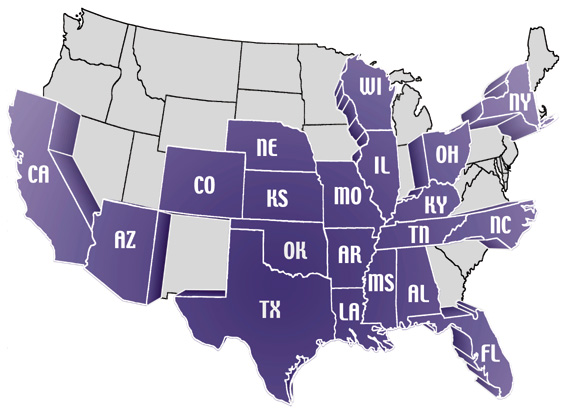
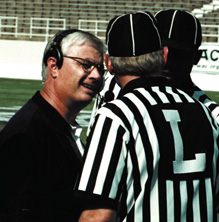 TCU head football coach Dennis Franchione said there are
benefits from a football standpoint to joining C-USA.
TCU head football coach Dennis Franchione said there are
benefits from a football standpoint to joining C-USA.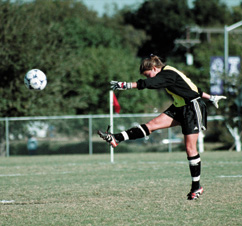 "I think it is great that TCU is making
the move," head soccer coach David Rubinson said. "Conference
USA has great soccer schools. Whenever our teams hear the whistle, though,
it doesn't matter who we are playing. We are going to play to win."
"I think it is great that TCU is making
the move," head soccer coach David Rubinson said. "Conference
USA has great soccer schools. Whenever our teams hear the whistle, though,
it doesn't matter who we are playing. We are going to play to win."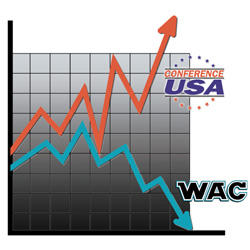
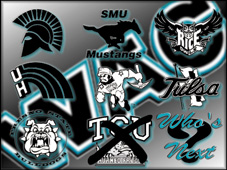 In addition to regional expansion, the WAC gains an increase
in bowl coverage, more competitive women's sports and greater availability
for recruiting.
In addition to regional expansion, the WAC gains an increase
in bowl coverage, more competitive women's sports and greater availability
for recruiting.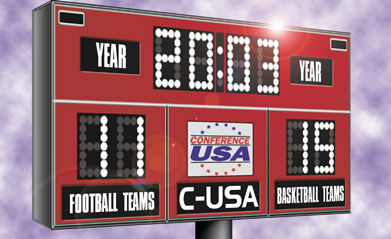
 TCU has decided to move on to the slightly more prestigious
Conference USA after two seasons of playing games before a half-full Amon
G. Carter Stadium. The Horned Frogs are now one of the latest programs
to desert the Western Athletic Conference, a league in which 10 of its
16 members have tried to flee in the last two years (nine have succeeded).
The C-USA has what the WAC doesn't: a guaranteed football bowl game, a
potentially lucrative television contract and stability.
TCU has decided to move on to the slightly more prestigious
Conference USA after two seasons of playing games before a half-full Amon
G. Carter Stadium. The Horned Frogs are now one of the latest programs
to desert the Western Athletic Conference, a league in which 10 of its
16 members have tried to flee in the last two years (nine have succeeded).
The C-USA has what the WAC doesn't: a guaranteed football bowl game, a
potentially lucrative television contract and stability.